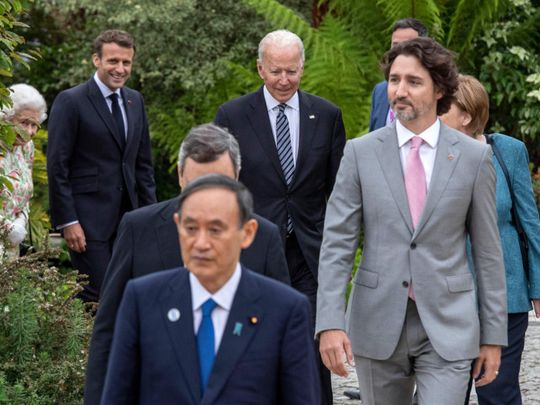
Plymouth, England: Call it the much-welcomed death of Zoom diplomacy.
President Joe Biden and six leaders from the world’s richest nations are meeting - face-to-face - in a picturesque, seaside resort in Cornwall, on England’s southwestern shore. It is the first in-person global summit meeting since the coronavirus pandemic shut down travel and forced presidents and prime ministers to reach for the “raise hand” button, just like everyone else.
So far, proximity appears to be working in favor of cooperation.
Summit meetings are always full of prepackaged “deliverables,” but stage management always works better when there is an actual stage. So as Friday’s summit opened, Prime Minister Boris Johnson of Britain, who is not only hosting the gathering but lured most of the royal family to a formal dinner, announced that the Group of 7 nations would collectively donate 1 billion doses of the coronavirus vaccine to the developing world.
It was a very conscious effort to show that the world’s richest democracies can catch up with China’s moves to establish itself as a leader in the fight against the coronavirus. The G-7 pledge includes Biden’s promise to deliver 500 million doses of the Pfizer-BioNTech vaccine.
260m doses from China
But as the leaders gathered in hastily built meeting rooms just feet from a sandy shore, they were acutely aware that beyond the humanitarian gesture lay a big geopolitical move, coming as more than 260 million doses of China’s COVID-19 vaccines have been sent to 95 countries, according to Bridge Consulting, a Beijing-based consultancy.
The leaders gathered in Carbis Bay in Cornwall have also agreed, at least in concept, to Biden’s proposal for a 15% minimum global tax to keep corporations from engaging in a race to the tax-burden bottom. And the group appears poised to issue a unanimous embrace of tougher emissions goals ahead of a major climate change summit this year.
Balm for Joe Biden
But the real sign that in-person diplomacy is back was Friday’s dinner, with plenty of royalty, from Queen Elizabeth to Prince Charles, Prince William and his wife, Kate, who earlier in the day met with the first lady, Jill Biden, at a British school. They dined at the Eden Project, an environmental charity that features rainforests capped by several large biomes along Cornwell’s shores.
It was balm for Joe Biden, who loved nothing more than jetting around the world as chair of the Senate Foreign Relations Committee and then as vice president - a man who actually enjoyed roaming the halls of the famed Hotel Bayerischer Hof, where the Munich Security Conference is held each year. He could be seen, two hands on a diplomat’s shoulder, making his point, persuading, posing for pictures.
Strict rules
Then such travel all came to a crashing stop. He campaigned from his basement. Once elected, his aides had strict rules that no more than five people could be in a White House office at a time. Four months ago, Biden held his first work-from-home meeting with a world leader, conferring with Prime Minister Justin Trudeau of Canada in the only viable way during a pandemic: a video call from the Roosevelt Room in the White House.
More Zoom calls followed: a virtual meeting of a group known as the Quad, which includes the president, along with the leaders of Australia, India and Japan; and then a global climate summit “hosted” by Biden but conducted “Brady Bunch” style, with leaders stacked in video squares on big screens.
Farewell visit
He tiptoed into real, human visits, inviting Prime Minister Yoshihide Suga of Japan and then President Moon Jae-in of South Korea, to the White House for brief visits. (Chancellor Angela Merkel of Germany is next, the White House said Friday, coming for a farewell visit on July 15, just before she leaves office.)
This week, the one-at-a-time meetings ended.
Biden jetted across the Atlantic for an eight-day in-person round of global backslapping and private confrontations. On Friday, he attended the first day of a G-7 meeting. Then comes a full meeting of NATO leaders, and of the European Union, before the trip’s main event: a one-on-one faceoff with President Vladimir Putin of Russia.
“I don’t think it’s possible to overstate the importance of face-to-face diplomacy,” said Madeleine Albright, who served as secretary of state under President Bill Clinton.








